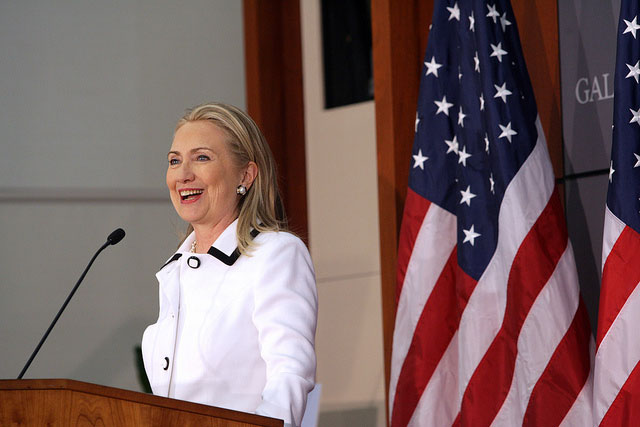
Part of the Series
Beyond the Sound Bites: Election 2016
As the presumed 2016 Democratic presidential nominee, Hillary Clinton has the opportunity to correct a mistake made almost a quarter century ago. She can reaffirm the party’s commitment to full employment.
In the summer of 1944, a time when the country was still fully enmeshed in World War II, the Democratic Party told voters:
“To speed victory, establish and maintain peace, guarantee full employment and provide prosperity — this is its platform.”
For the next 44 years, 11 party platforms reaffirmed the party’s commitment to full employment. The wording was often longer and sometimes comparably brief, but at each election the Democrats wanted to go on record as the party committed to full employment. Or at least they did until 1992.
That was the year that Bill Clinton won the Democratic presidential nomination. Bill Clinton quite openly described himself as a new type of Democrat. He distinguished himself from much of the party by supporting the death penalty, calling for “ending welfare as we know it,” and backing pro-business trade deals like NAFTA.
For new Democrats, a platform plank on full employment was old-fashioned labor and union-type politics. Clinton and his team had no interest in making this sort of commitment, as a result the words “full employment” do not appear in the 1992 party platform.
It’s now Hillary Clinton’s party. She will have control of a clear majority of the delegates in Philadelphia next month. This means that if she wants to reaffirm the commitment to full employment, she will certainly have the ability to include the language in the platform. (Of course Bernie Sanders delegates are likely to be fully supportive, since in both his presidential campaign and his time in Congress, Senator Sanders has been a strong proponent of full employment policies.)
Full employment is likely good politics, but it is also good policy. The only time in the last four decades where most workers saw consistent growth in real wages was the low unemployment years of the late 1990s. The productivity gains of this period were broadly shared, with wage growth at the bottom end of the wage ladder actually somewhat more rapid than at the middle and top.
In addition, the people who benefit most from low unemployment are the most disadvantaged. The African-American unemployment rate averages twice the white unemployment rate, while the unemployment rate for African-American teens is typically close to six times the unemployment rate for whites.
Suppose we could knock down the white unemployment rate by a percentage point with corresponding gains for African Americans and African-American teens. It is very difficult to envision a social program that would provide the same benefit to Black teens as a 6 percentage point drop in their unemployment rate.
As president, Clinton will have an immediate opportunity to affect employment levels, since she is likely to come into office with at least two vacancies on Federal Reserve’s Board of Governors. She will also have the opportunity to reappoint the chair, Janet Yellen, or name a replacement in her first year in office. If these appointees are committed to having the Fed maintain a policy of low interest rates it can have a substantial impact on the rate of growth of the economy and employment.
In addition to Fed policy, Clinton will also be designing budget and trade policies that can have a huge impact on both the level and composition of employment. On the budget, Clinton should be prepared to run deficits to finance infrastructure and other spending, especially when the economy faces a large and persistent demand gap (aka: secular stagnation). She should also support jobs programs for the most disadvantaged to give them a foot into the labor market.
Our $500 billion annual trade deficit is the major cause of the demand gap we face. Clinton should pursue policies to lower this deficit, most importantly by reducing the value of the dollar which will make US goods and services more competitively internationally. We will not get back the 4.4 million manufacturing jobs we’ve lost since Bill Clinton took office, but a smaller trade deficit could get back 1-2 million, and that would make a noticeable difference in the labor market.
It is often said that after parties approve their platforms they begin ignoring them immediately. There is much truth to this line. But it is more likely that a second President Clinton will take seriously a commitment that she has made than one she has not. It would be a big step forward if she reversed a mistake made by Bill Clinton and reaffirmed the Democratic Party’s commitment to full employment.
Trump is silencing political dissent. We appeal for your support.
Progressive nonprofits are the latest target caught in Trump’s crosshairs. With the aim of eliminating political opposition, Trump and his sycophants are working to curb government funding, constrain private foundations, and even cut tax-exempt status from organizations he dislikes.
We’re concerned, because Truthout is not immune to such bad-faith attacks.
We can only resist Trump’s attacks by cultivating a strong base of support. The right-wing mediasphere is funded comfortably by billionaire owners and venture capitalist philanthropists. At Truthout, we have you.
Our fundraising campaign is over, but we fell a bit short and still need your help. Please take a meaningful action in the fight against authoritarianism: make a one-time or monthly donation to Truthout. If you have the means, please dig deep.